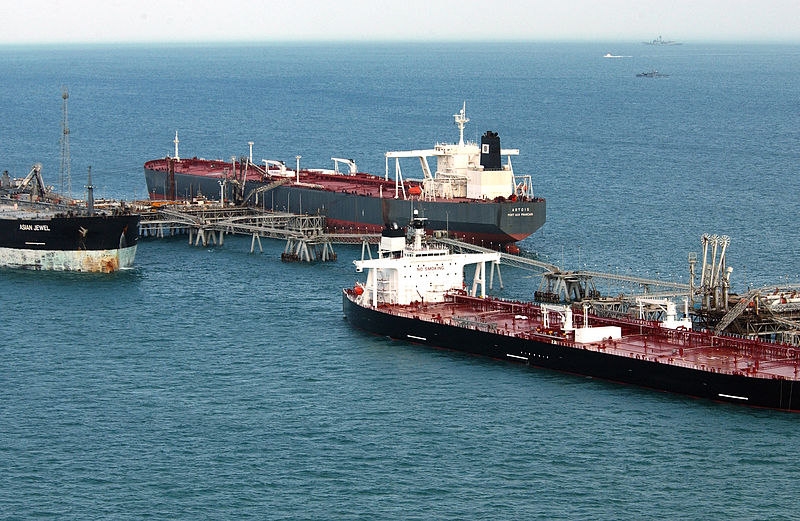by Jean-François Seznec
The latest attacks on the Arab Gulf oil industry seems to be part of a strategy by Iran to warn the Gulf states that it can block all oil shipments, if it sees fit.
Saturday’s extensive destruction of the Abqaiq oil processing plant passes the message that Iran has superior precision weapons that can wreak havoc on Saudi oil production. However, the message is perhaps even more dire. A few weeks ago, Iran (allegedly) mined three tankers at anchor off Fujairah in the Gulf of Oman. To make sure they meet their deadlines while keeping their tankers out of the Persian Gulf in case of sudden conflict, shipping firms anchor the tankers a few kilometers from Fujairah, within 24 hours of Gulf loading harbors. Now, of course, all oil producers, shippers, and “blue water navies’ know that Fujairah and the Gulf of Oman is not the safe haven they thought it was, and they have reason to believe that the 1.5 million b/d pipeline bypass from Abu Dhabi to Fujairah is likewise at risk. The mining of ships in Fujairah increases shipping costs and throws off base U.S. efforts to protect Gulf shipping. It shows in particular that aircraft carriers and accompanying fleets are susceptible to Iranian operations, even if some miles out of the Strait of Hormuz.
An attack in May on the East-West trans-Saudi pipeline, which has the capacity to ship 5 million b/d to Yanbu on the Red Sea coast, sent a similar message. If precision weapons can destroy pumping stations and processing plants, the bypass to the Red Sea will not be fully useable. Thus the Iranians are showing the Saudis that they can severely perturb all Saudi oil exports.
The attacks against the Saudi Aramco facilities in Abqaiq took place exactly one week after major changes in Saudi oil management. Saudi Aramco has a new chairman, Yasir al-Rumayyan, a financier non-engineer known for his non-oil investments. The highly respected former minister of energy, Khalid al-Falih, has been replaced by Crown Prince Mohammad bin Salman’s brother, Abdulaziz bin Salman, who is a well-known figure but has less charisma than his commoner predecessor and less credibility to oppose the crown prince’s policies. The attacks come at a time when Saudi oil policy is in transition, certainly taking the kingdom’s leadership off-guard. If the changes in the kingdom’s oil leadership did not deter potential investors from the widely anticipated Saudi Aramco IPO, certainly the Abqaiq incident will.
Presently, not only is Saudi Arabia surrounded militarily by Iran in Syria, Iraq and Yemen, but its main source of wealth is under assault. Iran is creating just enough havoc to humiliate Saudi Arabia, but has not yet pushed oil prices to $100/b, which could force the U.S. to retaliate.
The Saudis are in an existential battle with Iran, but they are in a difficult spot. If they don’t retaliate, they will invite many more attacks. However, they can only retaliate if the U.S. provides them with full military support and this is a time when the kingdom has the worst possible reputation in Washington and few U.S. leaders will want to risk military lives in the defense of Saudi Arabia and, in particular, of its Crown Prince.
Iran is well aware of the nature of the leadership in Washington, which they see as speaking loudly, but carrying a very small stick. The Iranians also view Mohammad bin Salman as having been weakened in the U.S. and Europe. Iran can be expected to continue and intensify its attacks against both U.S. and Saudi interests. Of course, this would be a dangerous course for them to take, the U.S. and Saudi leadership could eventually decide to retaliate and thereby open the door to war and massive destruction.
Jean-François Seznec is a political scientist specializing in business and finance in the Middle East. He is currently an adjunct professor in the School of Advanced International Studies (SAIS) at the Johns Hopkins University, and at Georgetown University’s McDonough School of Business and Edmund A. Walsh School of Foreign Service, in Washington, D.C.






Charles
Among those minorities are Sunni Baluchis who are followers of Deobandi school. That school holds that Shia are heretical Muslims and deserve desth.
Why are they then in Iran, in the Country of Imam Hussein, the Lands of The Wise Lord?
Why don’t they go back to Pakistan or India to be with others of their ilk?
Why don’t you or your country give them political asylum?
Are you not all bleeding hearts?